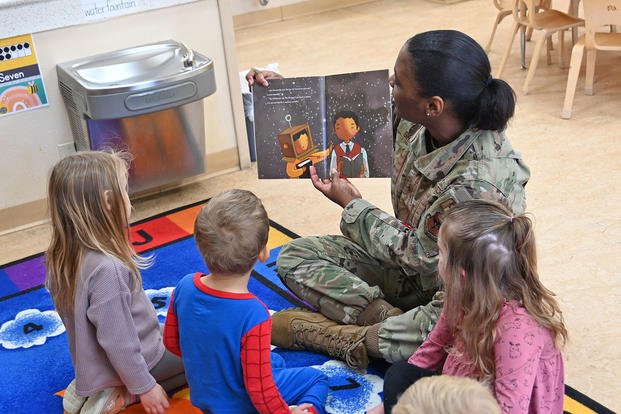Military families struggling to access child care because of staffing shortages at base day cares or because of frequent moves could get some relief under a pilot program being proposed by a bipartisan pair of senators.
Sen. Jeanne Shaheen, D-N.H., and Sen. Joni Ernst, R-Iowa -- both members of the Senate Armed Services Committee -- are introducing a bill Thursday that would allow the Defense Department to enter into partnerships with child-care providers around military bases with the aim of increasing the providers' capacity for military children, improving workforce development and boosting recruitment and retention of child care employees.
"Access to affordable, reliable child care is vital to our workforce, families and the overall economic development of our communities," Shaheen said in a written statement to Military.com ahead of the bill's introduction. "I'm proud to partner with Sen. Ernst to develop a first-of-its-kind pilot program to leverage resources from the Department of Defense to train child care providers, increase available child care slots in communities across the country and provide new career development opportunities that will strengthen the capacity of the child care sector overall and help early childhood education teachers thrive."
Read Next: Study Indicates Higher Rate of Rare Childhood Brain Cancer at New Mexico Air Force Base
While a shortage of child care workers is a nationwide problem and one goal of the bill is to boost child care providers at large, lawmakers have warned that a lack of access to child care is particularly acute for the military.
Wait-lists that can be as long as seven months have made on-base child care an untenable option for many military families, but service members are also often unable to afford the cost of civilian child care. In addition to facilities limits, lawmakers and defense officials have blamed staffing shortages for the wait-lists.
Every service has thousands of vacancies at their child development centers, according to a report released last week by a House panel that examined military quality-of-life issues. For example, the Army has nearly 7,000 open jobs, while the Navy has nearly 4,000 vacancies.
Military.com also reported last week that, while the services grapple with the staffing shortfalls, child abuse has gone unreported to parents and unanswered for amid military policies that are broadly crafted to shield the services from scrutiny.
Lawmakers have offered an array of proposals to fix the staffing shortages in recent years.
Last week's quality-of-life report from a House Armed Services Committee panel zeroed in on ensuring that child care workers are well-compensated, with the report saying that child care employees have in some cases chosen to leave for jobs in retail because the pay is better. The report's recommendations included paying military child care staff at a rate competitive with market rates and providing employees with free child care for at least their first child, among other proposals.
The bill from Shaheen and Ernst focuses on workforce development to recruit and retain more staff at child care centers around military bases so that military families have more options for child care.
"Right now, too many military families, including those in New Hampshire, face unique challenges in accessing high-quality, affordable child care due to frequent moves and new school enrollments for their children," Shaheen said in her statement.
Under the pilot program that would be created by the bill, the Pentagon would have to enter into 12 partnerships with child care providers near military installations, with each military service getting at least one partnership near one of their bases.
The partnerships could include using Defense Department resources to help providers with "recruitment and retention of employees, including through professional development and financial incentives," according to the bill text.
The pilot program could also include placing volunteers trained in education services from agencies such as AmeriCorps at the participating child care centers, according to the bill text and a summary from Shaheen's office.
The pilot program would run for at least four years and conclude with a report to Congress on how it went.
Related: Unsupervised: Military Child Care Centers Slow to Report Abuse with Little Oversight












